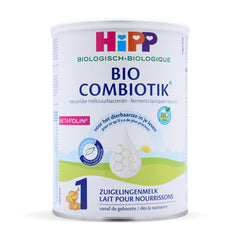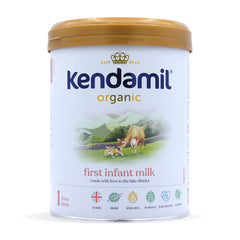Casein vs. Whey in Baby Formula
55 hours of research 3 minute read

Navigating the vast array of baby formulas available on the market can be overwhelming for any parent. Amidst the myriad of options, it's crucial to delve into the finer details of each formula's ingredients. One often overlooked aspect is the ratio of whey to casein, which constitutes the protein component of these formulas.
The Significance of Whey and Casein Ratios
The ratio of whey to casein is pivotal in understanding infant formula, as it directly impacts a baby's growth and development. For infants with sensitivities or allergies, this ratio can make a significant difference in their ability to tolerate the formula. One of the popular questions is: Does whey protein contain casein? To comprehend this aspect better, let's delve deeper into the roles of whey and casein in baby formulas.
The Dynamic Duo: Casein and Whey
Found in both breast milk and baby formulas derived from cow’s milk and goat’s milk, casein and whey proteins are essential for infants' overall well-being. These proteins boast an array of indispensable amino acids vital for various physiological functions:
- Phenylalanine: Crucial for protein and enzyme structure and function.
- Valine: Stimulates muscle growth, regeneration, and energy production.
- Threonine: Supports fat metabolism and immune function.
- Tryptophan: Regulates appetite, sleep, and mood.
- Methionine: Facilitates metabolism, detoxification, and tissue growth.
- Leucine: Key for protein synthesis, muscle repair, and blood sugar regulation.
- Isoleucine: Supports immune function, hemoglobin production, and energy regulation.
- Lysine: Essential for protein synthesis, hormone production, and calcium absorption.
- Histidine: Vital for immune response, digestion, and sleep-wake cycles.
The Crucial Role of Whey Protein
Whey protein, derived from cow's milk or goat's milk, mirrors a crucial aspect of breast milk. It is rich in essential amino acids, playing a vital role in various physiological functions essential for infant development:
- Muscle Growth and Repair: Whey protein promotes muscle growth and aids in tissue repair, critical for the rapid development phase of infants.
- Circulatory Support: It supports circulatory function, ensuring efficient nutrient delivery throughout the body.
- Antioxidant Defenses: Whey protein contributes to antioxidant defenses, safeguarding against oxidative stress.
- Healthy Weight and Metabolism: Its fast-digesting nature promotes healthy weight management and metabolic function in infants.
Casein Protein: The Slow-Digesting Sustainer
Casein, another component of cow's or goat's milk-based formulas, offers a contrasting yet equally essential role:
- Satiety and Sustained Nutrition: Casein takes longer to digest, providing a prolonged feeling of fullness and sustained nutrient release.
- Muscle Growth Support: It facilitates muscle growth and development, complementing the action of whey protein.
- Immune System Support: Casein contributes to immune system function, enhancing the body's defense mechanisms.
- Triglyceride Regulation: It helps maintain healthy triglyceride levels, crucial for cardiovascular health.
- Antioxidant Function: Similar to whey, casein also promotes antioxidant activity, bolstering infant health.
- Weight Regulation: Its slow-digesting nature aids in weight management and metabolic stability.
What is the Difference: Casein vs. Whey
Whey and casein are two types of proteins found in both breast milk and baby formulas, derived from cow's milk or goat's milk. These proteins offer distinct characteristics, each with its own set of benefits:
- Whey Protein: Known for its fast-digesting nature, whey protein is easy on the tummy and swiftly empties the stomach. This makes it ideal for infants who may have sensitive digestive systems. Moreover, whey protein boasts a high concentration of essential amino acids, supporting muscle growth, immune function, and overall development.
- Casein Protein: In contrast, casein protein digests more slowly, providing a sustained release of nutrients. This prolonged digestion helps keep babies feeling fuller for longer periods, making it an excellent choice for promoting satiety. Additionally, casein protein contributes to muscle growth, immune support, and maintaining healthy triglyceride levels.
The Whey to Casein Ratio: Finding the Perfect Balance
One crucial aspect to consider when selecting a baby formula is the whey-to-casein ratio. Formulas with a higher percentage of whey protein are often easier to digest and may be better tolerated by sensitive infants. On the other hand, formulas with a balanced ratio of whey to casein offer the benefits of both proteins, supporting optimal growth and development.
Whey to Casein Ratios in Popular Baby Formulas:
| Baby Formula | Whey to Casein Ratio |
|---|---|
| HiPP German Formula | 60:40 |
| HiPP UK Formula | 50:50 |
| HiPP Dutch Formula | 60:40 |
| Holle Bio Formula | 40:60 |
| Holle A2 Formula | 50:50 |
| Lebenswert Formula | 60:40 |
| Kendamil Organic Formula | 50:50 |
| Kendamil Goat Formula | 50:50 |
| Kendamil Classic Formula | 50:50 |
| Nannycare Formula | 80:20 |
| Kabrita Formula | 50:50 |
Exploring the Nuances of Whey and Casein Proteins in Baby Formula
Understanding the intricacies of whey and casein proteins is essential for parents navigating the world of infant nutrition. Let's delve into the key points to grasp the significance of these proteins in baby formula:
1. Whey and Casein: The Building Blocks of Milk Protein
- Complete Proteins: Whey and casein proteins, found in human, cow, or other mammal milk, are considered complete proteins. This means they contain all the essential amino acids necessary for infant growth and development.
- High Biological Value: Both whey and casein offer a high biological value, meaning they are efficiently utilized by the body to support various physiological functions.
2. Understanding the Ratios
- Breastmilk Composition: Human breastmilk typically maintains a whey-to-casein ratio of approximately 60:40. This balance is thought to support optimal digestion and nutrient absorption in infants.
- Cow’s Milk Variation: In contrast, cow’s milk protein exhibits a whey-to-casein ratio close to 20:80. Understanding this disparity is crucial when selecting baby formulas, as it impacts digestibility and tolerability.
3. Considerations for Specialty Formulas
- Medical Diagnoses: Specialty formulas designed for infants with specific medical conditions may alter the whey-to-casein ratio or modify the protein composition. These formulations cater to unique nutritional needs and digestive sensitivities.
- General Tolerance: While some infants may require specialized formulas, most healthy babies tolerate standard formulas containing both whey and casein well. However, individual preferences and tolerances vary, so it's essential to monitor your baby's response.
4. Listening to Your Baby
- Individual Needs: Every baby is unique, and their response to different formulas may vary. Pay attention to your baby's cues and behavior to gauge their comfort and satisfaction with their feeding regimen.
- Consultation with Pediatrician: If you have any concerns or questions regarding your baby's nutrition or formula selection, don't hesitate to consult your pediatrician. They can offer personalized guidance and recommendations based on your baby's specific needs.
Milk Protein vs. Whey Protein in Baby Formula
Selecting the appropriate infant formula involves considering the protein source, whether milk protein or whey protein and its implications for infant nutrition. Milk-based formulas contain both casein and whey proteins, providing a balance akin to breast milk, while whey-based formulas offer easier digestion and may suit infants with gastrointestinal sensitivities. Research suggests both formula types support normal growth and are generally well-tolerated, although whey-based formulas may lead to softer stools. Individual factors such as tolerance, digestion, and specific health conditions should guide formula selection, with healthcare professional guidance ensuring informed decisions for optimal infant growth and development.
Making Informed Choices for Your Baby's Nutrition
Understanding the whey-to-casein ratio in baby formulas is crucial for parents seeking the best nutrition for their infants. By grasping the distinct roles of whey and casein and their respective ratios in different formulas, parents can make informed decisions tailored to their baby's needs. Whether prioritizing digestibility, immune support, or overall growth, selecting a formula with an appropriate whey-to-casein ratio is fundamental in promoting optimal infant health and development.
We are committed to providing families with trusted, nutritionally complete formulas, ensuring peace of mind for parents navigating the intricate world of infant nutrition. Join us in this journey towards nurturing healthy, thriving babies with formulas that prioritize purity, quality, and efficacy.
3 Most Popular European Baby Formulas With Whey and Casein
Organic Life Start is committed to providing accurate, reliable, and trustworthy information to parents and caregivers. We carefully choose credible sources and follow a meticulous fact-checking process to uphold the highest standards in infant nutrition and parenting advice. To learn more about our dedication to accuracy, please explore our editorial guidelines.
Link To Sources











Addisyn Merrill -
My little Akiko has really liked HiPP German. I love how it mixes casein and whey so beautifully. It gives her the nutrients she needs without making her stomach hurt. Seeing her becoming stronger and healthier makes me feel better about the choice we made. The recipe is mild, easy to digest, and works well for her. It’s nice to know that she’s getting good food every time she eats. For us, HiPP German has made feeding time smooth and stress-free, which I really admire.
Holly C -
February 13, 2026
As parents, we learned how important it is to consider the whey and casein ratio in baby formula, especially for a baby with a sensitive tummy. Consulting our pediatrician helped us understand how different protein ratios can affect digestion and comfort. A formula with a more suitable balance can be gentler and easier for our baby to tolerate. With professional guidance, we were able to avoid unnecessary discomfort and feeding issues. This experience taught us that working closely with a pediatrician is essential when choosing the right nutrition for a sensitive baby.
Naomi Cook -
January 29, 2026
I wasn’t sure at first whether a casein or whey-based formula would suit my son Brian best. After learning more and observing how he responded, I found that HiPP Dutch formula matched his needs perfectly. He digests it easily and seems comfortable after every feed, which brings me so much peace of mind. Choosing the right formula really makes a difference in his happiness and well-being.